These AI-generated PC cases are more proof that AI isn't ready to steal our jobs
Stop panicking, AI isn’t about to take over the world
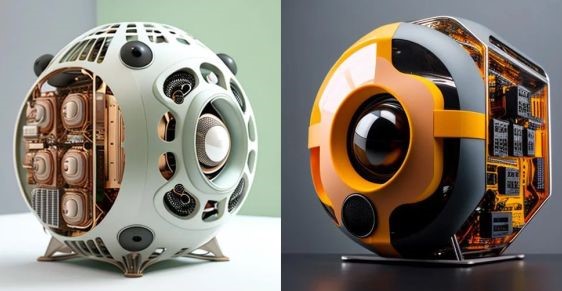
Sign up for breaking news, reviews, opinion, top tech deals, and more.
You are now subscribed
Your newsletter sign-up was successful
If you’ve ever been on the lookout for a new case for your next custom PC build (or you’re considering transplanting your existing system into a new, better chassis), you’ll no doubt have spent some time down the rabbit hole that is the PC case market.
The standards used for computer cases haven’t changed much over the last decade; the same familiar sizing scales (like ATX, E-ATX, ITX, and so on) have endured for years, as have features such as drive cages and cable routing solutions.
But forget about all those vital elements that make up one of the best PC cases! We don’t need ‘em! All that matters is that your gaming PC looks cool as hell, right? To that end, a Redditor has had a brainwave for producing innovative and exciting new case designs: don’t design a damn thing, just get AI to do it for you.
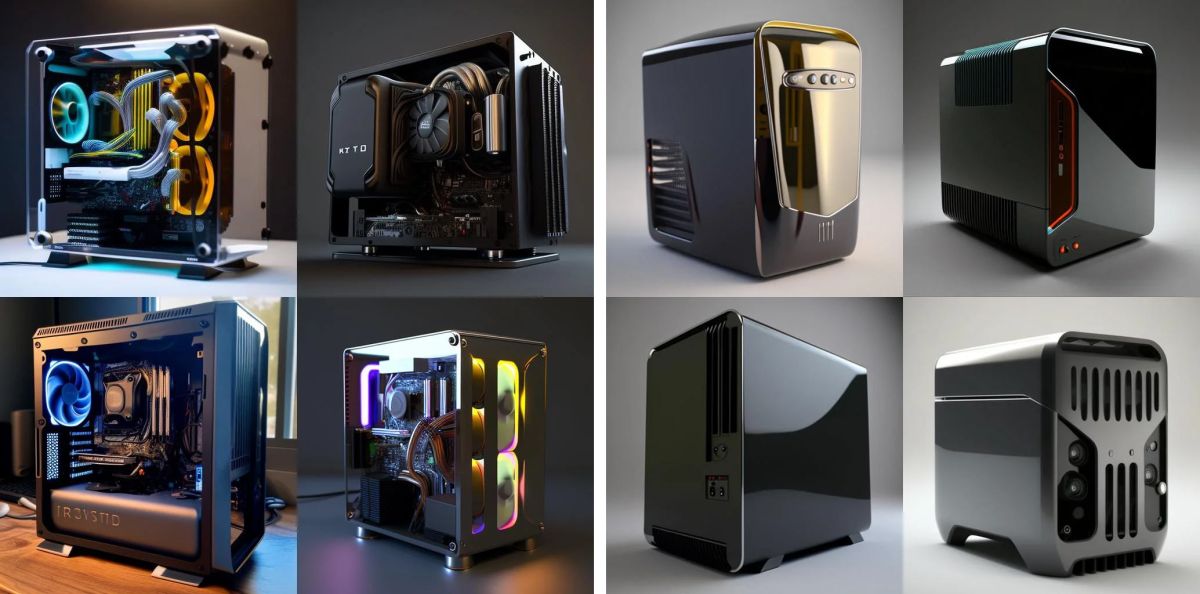
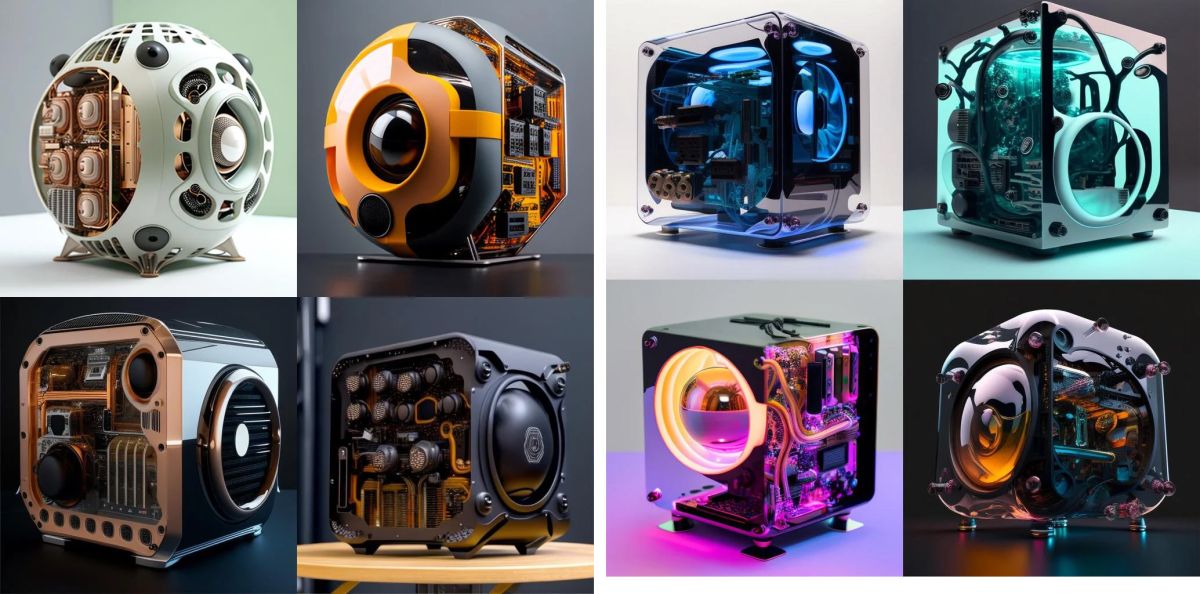
Using the Midjourney AI (one of the more popular image-generation bots right now), the user produced a collection of 28 concepts for mini-ITX cases, some of which wouldn’t look out of place on the workbench of a seasoned PC case modder.
The designs vary from rather straightforward – reminiscent of standard fare from the likes of Corsair and Cooler Master – while others look wild. I’m actually pretty sure I saw some of these spherical machines trying to blast Tom Cruise in the 2013 snoozefest Oblivion. But these designs from Midjourney do share one defining characteristic: they are, as the kids would say, appropriately ‘mid’. (For those not down with the zoomer lingo, ‘mid’ means mediocre.)

AI isn’t really AI – at least, not yet
When you think about AI, what do you think of? Depending on your age, odds are that one of several movies will come to mind; older readers might go straight to the iconic red dot of 2001: A Space Odyssey’s HAL 9000 or perhaps Ash from the original Alien, while those who – like – grew up in Spielberg’s golden era of family-friendly blockbusters will probably think of A.I. Artificial Intelligence.
Self-aware machine intelligences have long been the subject of entertainment media and we just can’t stop ourselves from loving it, evidenced by the critical success of movies such as Her and Ex Machina. But these films always present AI as something difficult to understand or comprehend; a notion entirely at odds with how we engage with AI in the real world. We’re still a long way off from homicidal software taking over our bodies like the unfortunate protagonist of Upgrade (which I’m unashamedly plugging here, that movie rocks).
Sign up for breaking news, reviews, opinion, top tech deals, and more.
See, when we talk about the AI that actually exists in our day-to-day lives – whether that’s the voice assistants in our phones or the resolution upscaling tech in the best graphics cards – we’re not actually talking about real artificial intelligence. What we really mean is usually either ‘virtual intelligence’ or machine-learning programs.

What AI is, and what it isn’t
The former of these, sometimes called VIs, are essentially just software that can mimic sentience to a reasonable degree to fulfil a defined purpose. A simple chatbot on a retailer’s website is an example of a virtual intelligence; you could feasibly have a full discussion with it if you remain within its predefined conversational parameters, but it’s easy to reveal as a bot and it doesn’t have the capacity to learn or improve itself based on new information.
Machine learning, on the other hand, is a lot closer to ‘true’ AI. This refers to a software system that is capable of analyzing and interpreting information by itself, then ‘learning’ and adapting without any input from its creators.
It’s worth noting that this doesn’t actually constitute original thought. Machine learning programs are simply amalgamating data and drawing conclusions based on that data, then self-modifying to better carry out their assigned tasks. Without a data pool to draw from, they aren’t capable of anything beyond what their initial programming permits.
With this in mind, it’s not hard to see how the Midjourney AI went about creating these PC case concepts. Broadly speaking, a lot of mini-ITX gaming computers do look the same; a small box with a glass side panel, coolant tubes, and a big round fan mounting on the front. When completing this assignment, Midjourney understood those all to be characteristics of a mini-ITX PC, and dutifully recreated that: so we got some small boxes with big circles on the fronts. It’s a visual imitation; the idea of a PC case rather than an actual design. None of these have been properly designed to accommodate all the components a PC-builder needs.
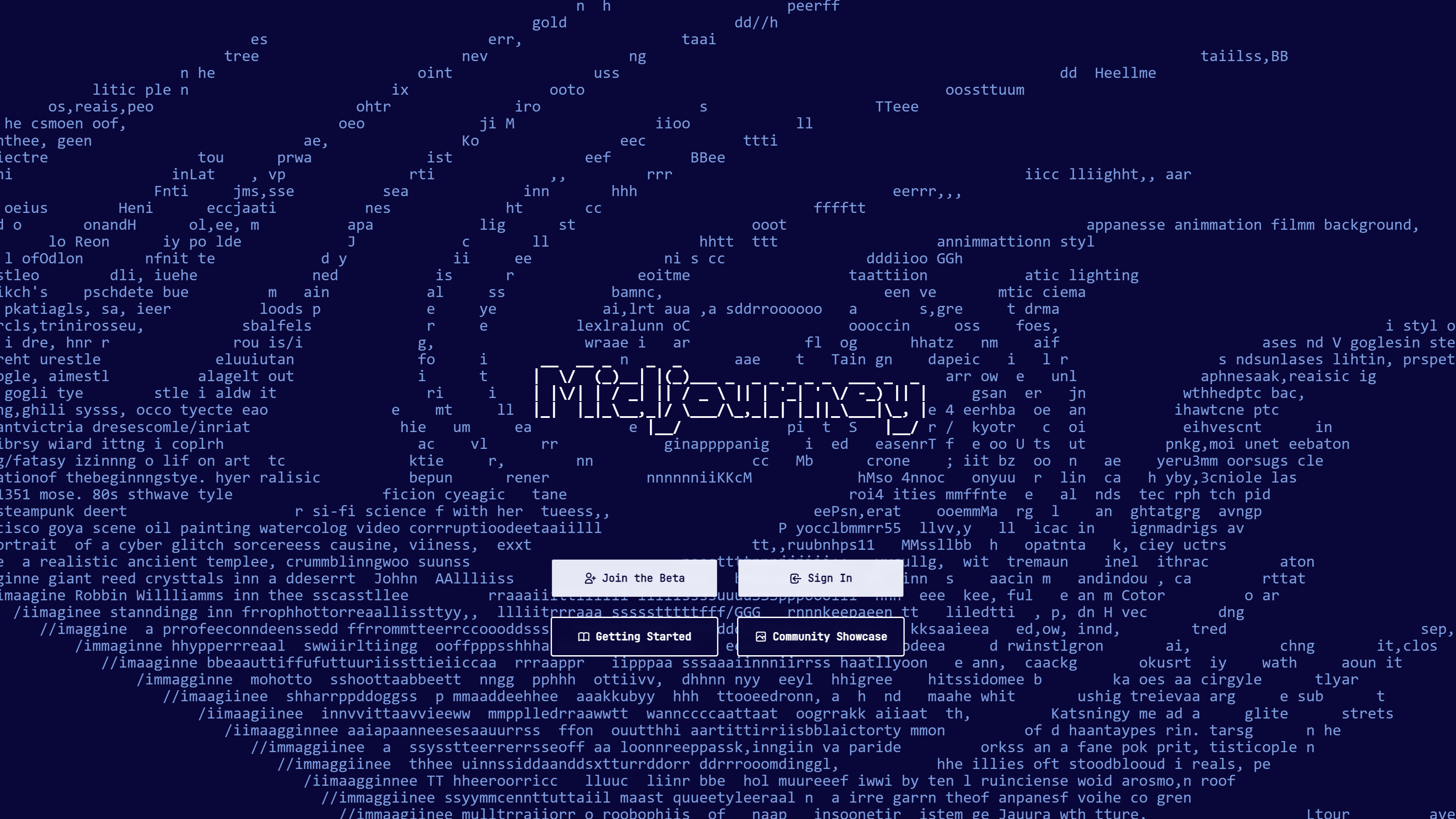
AI is being held back by factors beyond its control
Could a properly-trained deep learning program actually design a whole PC case, though, if it were given the full suite of information required to do so? Probably, yes – if not now, then a few months or years down the line.
The capabilities of what modern-day ‘AI’ can produce in the digital world are pretty phenomenal. We’ve already seen writing bot ChatGPT create everything from poetry to college essays, and more recently it’s been put to work behind a series of malicious cyberattacks.
Our own Alex Whitelock has already made some excellent points regarding whether ChatGPU is going to steal your job, and he concluded that AI is more likely to become a helpful tool we use to make our jobs easier, rather than replacing us entirely. Ultimately, some jobs should be automated, to at least some degree.
Alex was discussing jobs that could feasibly be impacted by the advent of powerful, efficient deep learning tools, but I’m more interested in the wealth of jobs that AI literally can’t do, and probably won’t be able to do for decades or longer – if ever. ChatGPT can write a novel, but it can’t change a tire, supervise a toddler, or treat a cancer patient. For that, we need robotics.
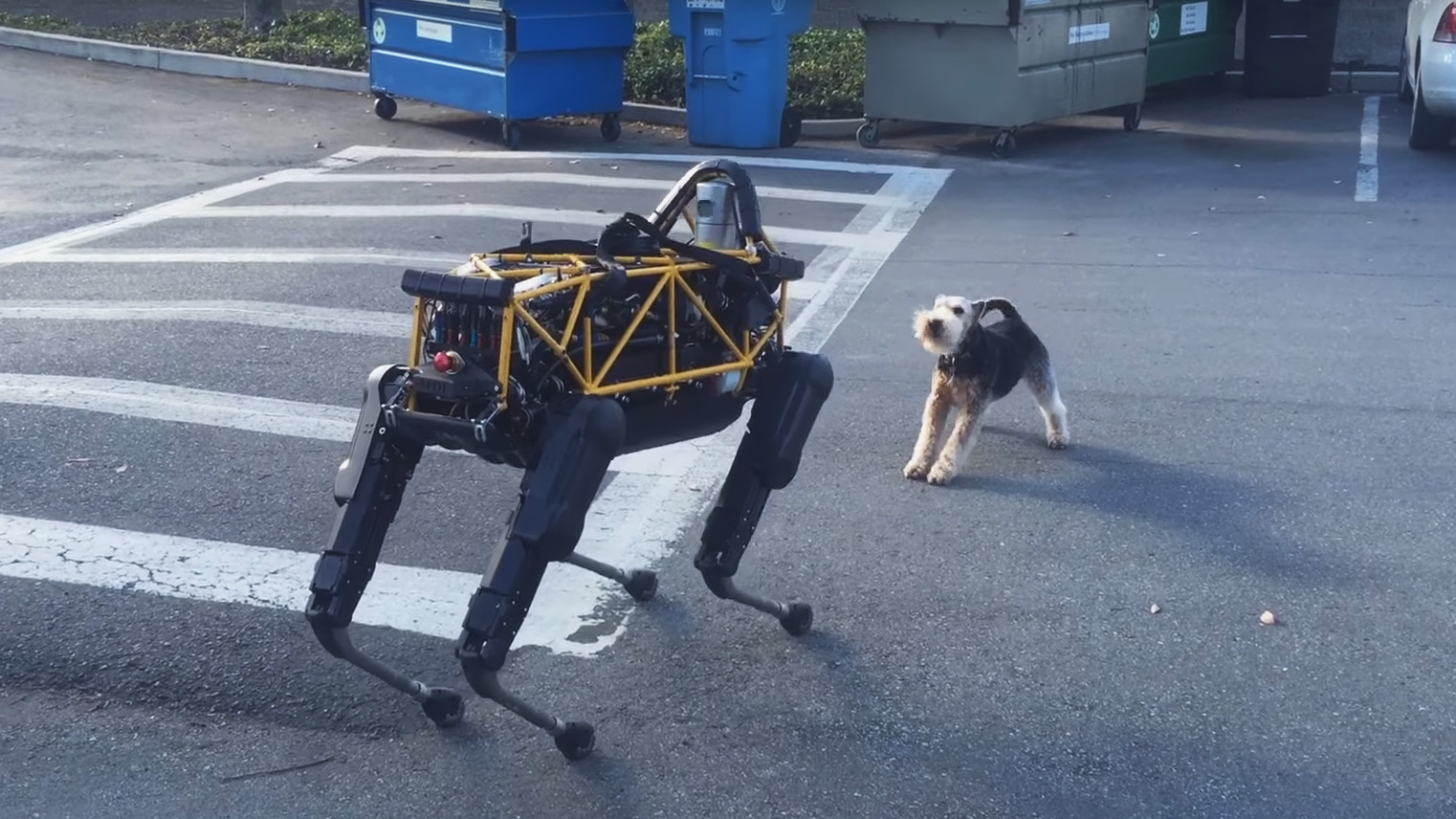
Rise of the robots
The robotics industry is a personal fascination of mine, and while it’s made some incredible leaps and strides in the past few decades, it’s not seeing anywhere near the kind of advancement that AI technology is currently enjoying.
Sure, I’ve seen the genuinely incredible footage of the ‘Atlas’ robot from Boston Dynamics running, jumping, and carrying objects with ease, and some recent developments in robotics are, uh, a little terrifying, but come on. These machines aren’t scalable for global rollout; BD’s premium ‘SPOT’ quadruped robot costs over $200,000, so you won’t be seeing them replace warehouse workers anytime soon.
In fact, the frankly abysmal showing of Elon Musk’s humanoid Teslabot ‘Optimus’ would appear to indicate that widespread implementation of robots in our daily lives is very far off indeed, and without physical bodies to invade our workplaces, AI tools like ChatGPT aren’t going to be replacing most people anytime soon.
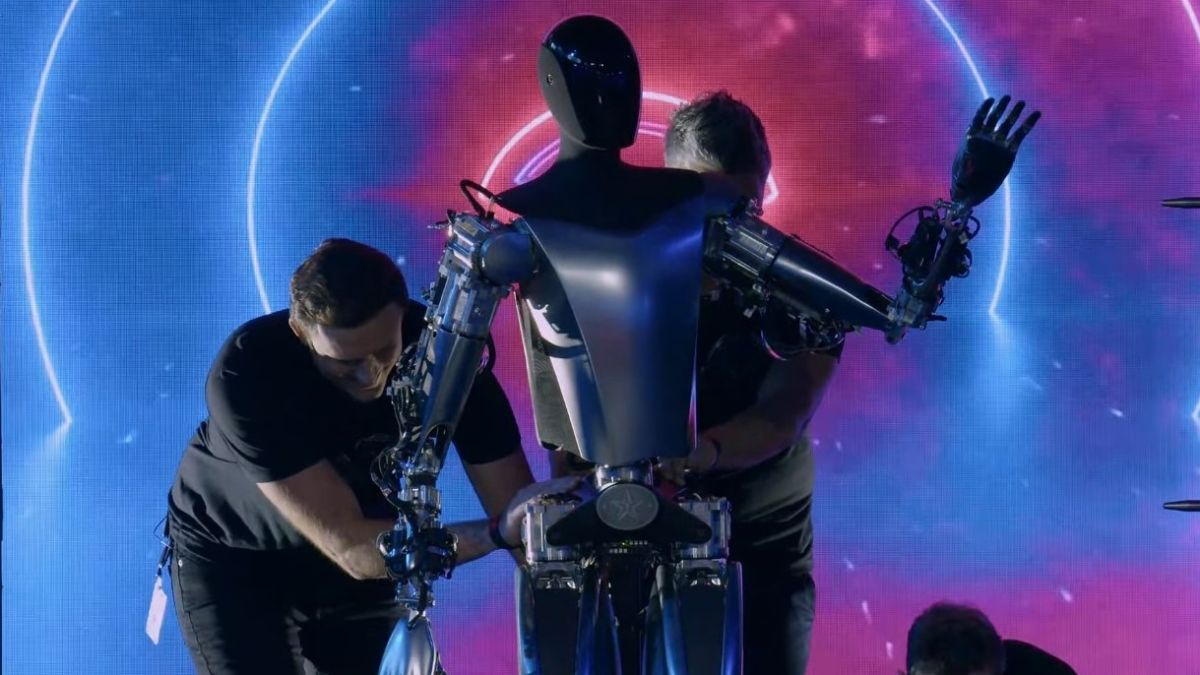
This is the fatal flaw of AI. Sure, I’ve worried in the past about being replaced by a chatbot that can spit out tech news articles at fifty times the rate I can write them, but AI can’t meaningfully review a laptop – how exactly would software tell you how the keyboard feels to type on, or how well the display performs in sunlight? It’s easy to get carried away with the impressive capabilities of modern machine learning, but we underestimate the value of our bodies occupying the physical world, rather than the digital one.
So no, AI isn’t going to steal your job. It actually can’t. And even if it could, I have one last point to make. Have you ever considered that an awful lot of powerful, wealthy individuals don’t actually want AI to take over everyone’s job? After all, if we all suddenly had a ton of time on our hands thanks to AI automation, we might collectively start taking a long, hard look at the myriad inequalities within our society – and nobody wants that, right?
…right?

Christian is TechRadar’s UK-based Computing Editor. He came to us from Maximum PC magazine, where he fell in love with computer hardware and building PCs. He was a regular fixture amongst our freelance review team before making the jump to TechRadar, and can usually be found drooling over the latest high-end graphics card or gaming laptop before looking at his bank account balance and crying.
Christian is a keen campaigner for LGBTQ+ rights and the owner of a charming rescue dog named Lucy, having adopted her after he beat cancer in 2021. She keeps him fit and healthy through a combination of face-licking and long walks, and only occasionally barks at him to demand treats when he’s trying to work from home.